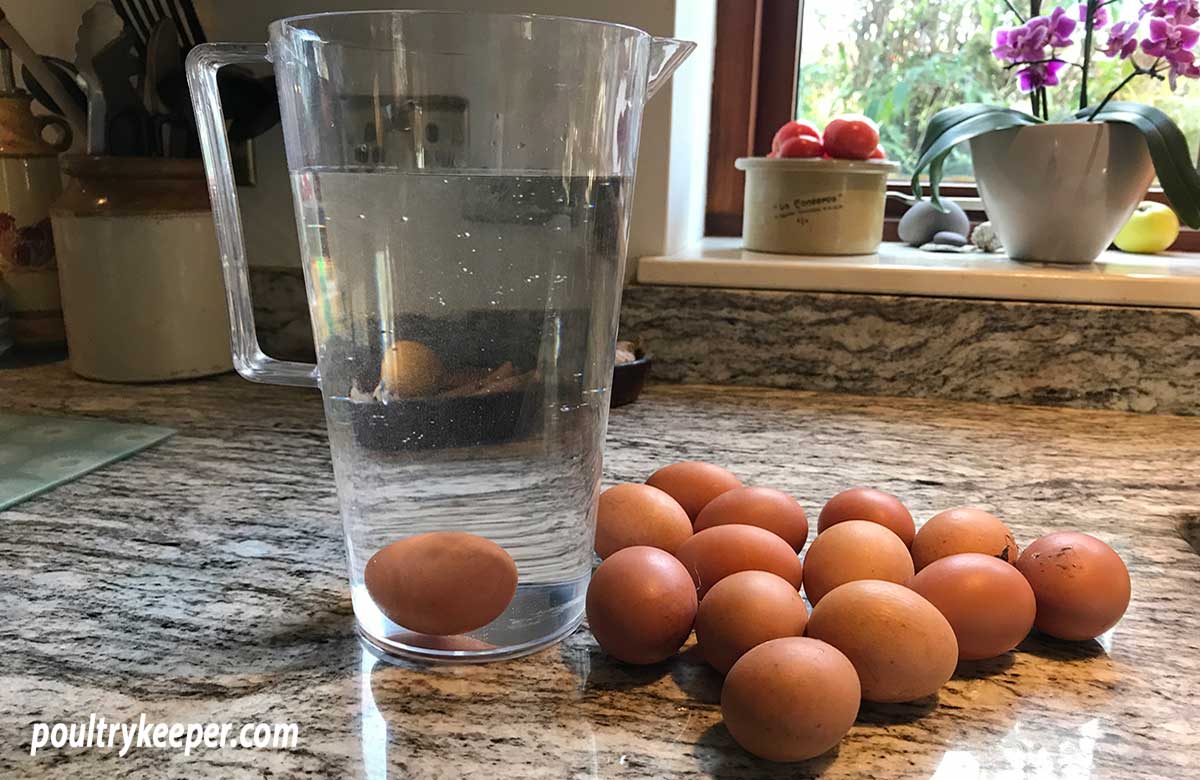
What's going on inside the egg?
Eggshells are porous. In nature, this allows a chick to get oxygen from the outside world during its development.
There is a pocket of air (called the air-sac) at the broad end of an egg. This increases in size as the egg gets older.
The contents of the egg shrink as moisture is slowly evaporating through the shell. Before it hatches, a chick pokes it’s beak into the air-sac to take its first breath of air. It then ‘pips’, making a small hole through the shell with a special ‘egg tooth’ attached to the beak so it can start breathing air from the outside world.
As the egg ages and the air-sac increases in size, the egg becomes more buoyant with the additional oxygen.
If you want to learn about the inside of an egg, there is more information about eggs here.
How to tell if eggs are fresh
The egg float test
The egg float test only works for uncracked eggs but is quite simple. Take a clear jug or another container that you can see through and fill it three-quarters full with water. If the egg:
- Sinks to the bottom and lays flat on its side. It is very fresh.
- Sinks, but doesn’t lay flat; it is a few days old and still should be considered fresh.
- If the broad end of the egg lifts from the bottom, it is usually a week or two old.
- If the egg floats, it is an older egg.
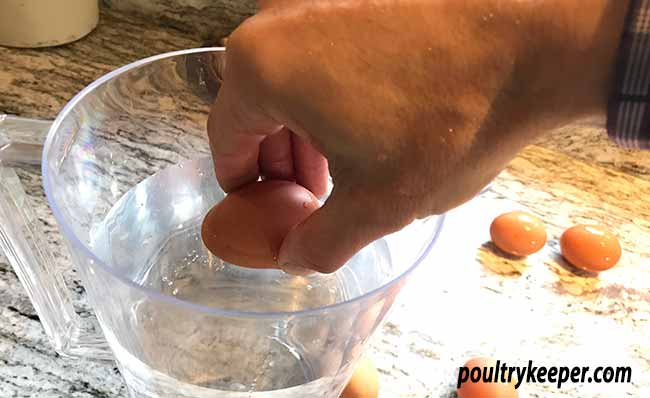
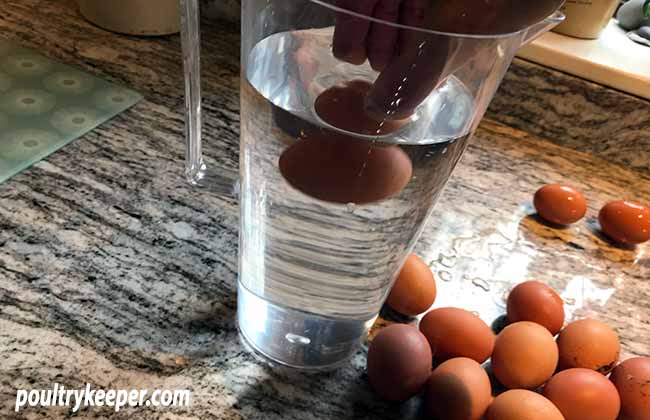
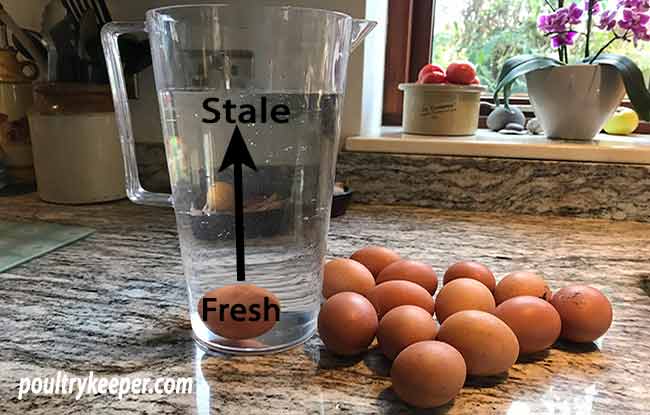
If eggs are a few weeks old, they are still good to eat, so don’t worry if you have eggs that stand on one end at the bottom of the bowl.
Once eggs have been in a water float test, use them immediately afterwards. Eggshells are porous, and once you wash the membrane/cuticle off, bacteria can enter through the pores.
Now you know how to tell if eggs are fresh!
Quick questions
If an egg does float to the surface, it means it’s old and needs to be cracked open into a bowl and checked but as the egg safety centre says, a floating egg does not necessarily equal a bad egg!
When refrigerated, eggs often remain fresh after their expiry date but is it worth taking a risk? I’d say no. The storage time for eggs in their shells is typically 3 to 5 weeks.
If eggs are badly soiled, I discard them (well, they are washed and given to our dog), but we don’t get many like this with good nestbox hygiene.
Lightly soiled eggs are stored but washed in warm water before use.
A chicken egg has a thin, protective membrane or cuticle coating the porous shell, which prevents bacteria from penetrating it.
Washing an egg removes the cuticle, which is why we only wash our eggs before using them.
It is also why eggs should be used soon after performing an egg float test.
I never have refrigerated eggs my chickens have laid. I store them in a cool cupboard away from sunlight. We don’t date our eggs, so fresh eggs go at the back of the tray, and we use eggs from the front. We usually eat them within a week, two at the most, so they are fresh.
We discard eggs that are badly soiled (well, they are washed off and given to our dog), but we don’t get many like this with good nestbox hygiene. Lightly soiled eggs are stored but washed in warm water before use.
When we have excess, we make more cakes, sell a few eggs at the gate and give some away to friends and neighbours.
So why is there food safety advice saying eggs should be refrigerated?
During the 1970s, US egg producers started washing and refrigerating eggs because of concerns about foodborne illnesses. Eggs are now washed and refrigerated in the US, Canada, Japan, and Scandinavia.
In the United States, they take a further step: The US Department of Agriculture (USDA) says the best way to fight salmonella is to ensure eggs are clean, and the law in the US says eggs must be refrigerated. Egg producers with 3,000 hens or more must wash and refrigerate their eggs before they leave the farm.
In Europe, eggs are stored (and sold) at room temperatures. Eggs are coated with a membrane as they come out of the reproductive tract. It prevents bacteria from penetrating the shell.
In studies, there is no doubt; refrigeration maintains the quality of eggs for more extended periods. There are also food safety recommendations on egg boxes saying eggs should be refrigerated.
Cracking the egg open
To check an egg, crack it into onto a plate or flat surface. A fresh egg will have the yolk standing upright with an inner, gelatinous ring of albumen (egg white) around it. There will be a little thinner egg white spreading around that.
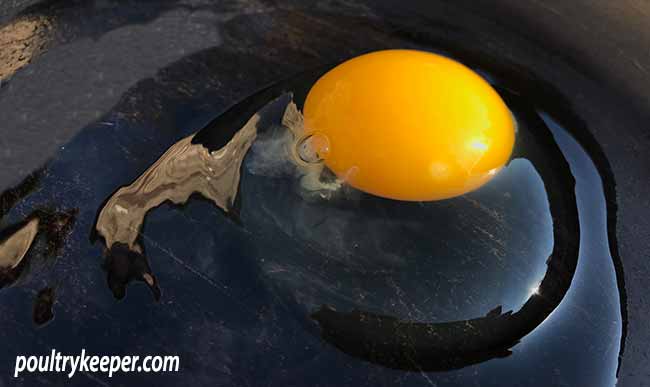
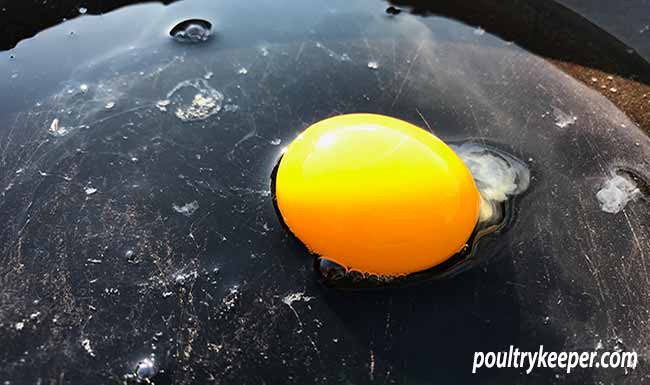
Next, smell the egg. A spoiled egg will have an unpleasant odour (hence the saying stinks like a rotten egg). If it smells fine, then there should be no problem eating it.
One final note. Some eggs will have watery whites. It can be a disease or the age of hen, so it’s not always a reliable indication of freshness. The egg water test is a better way to estimate the freshness of an egg.
If you are wondering what eggshell colours are possible, then Gail Damerow has written an interesting article on chicken eggshell colours.

